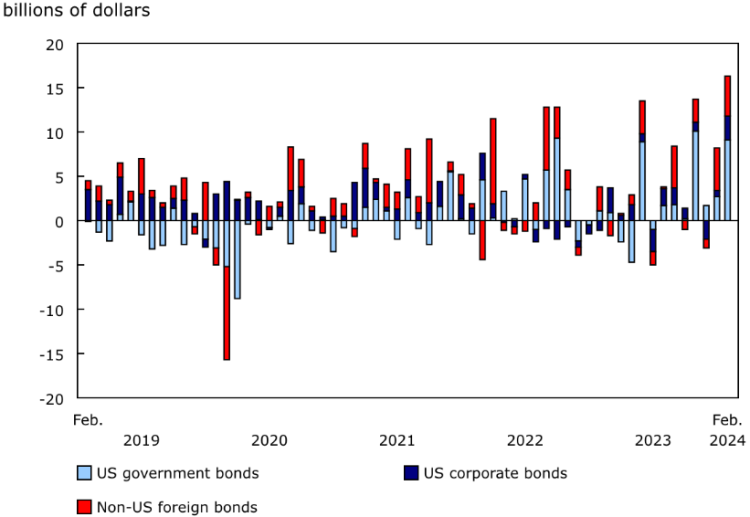加拿大国内外的投资者正以创纪录的速度撤资
https://news.yorkbbs.ca/detail/local/3884ffea-fe52-40a9-9163-9287b66c080b
2024-04-21 约克论坛
加拿大投资者逃往国外证券市场,债券创下纪录
加拿大投资者正将创纪录的大量现金投入国外市场。2 月份,投资者购买了 242 亿加元的外国证券,而 1 月份则为 76 亿加元。大部分资金都投入了外国债券,创下了纪录。
加拿大投资者将创纪录的现金投入外国债券
加拿大资本流到外国债券净额的月度分布。正数表示投入外国债券的资金多于撤出的资金。

图源:Statistics Canada
美国是加拿大投资者追逐外国投资的最大赢家。2 月份总共购买了 163 亿加元的外国债券,创下了历史新高。美国债券占其中的 91 亿加元。此外,加拿大人还在当月购买了 91 亿加元的美国股票。
外国投资者继续逃离加拿大
加拿大人并没有引领潮流,而是加入了全球资本逃离加拿大的行列。2 月份,外国投资者抛售了价值 88 亿加元的证券。在此之前的三个月中,外国投资者的撤资活动异常活跃,共抛售了价值 310 亿加元的证券。
国内外投资者纷纷撤资
加拿大的国际证券净流量--流入资本市场的资金余额。如果净流量为负数,则表示离开的资金多于流入的资金。

图源:Statistics Canada
此外,外国投资者减持了 "史无前例 "的政府票据(债务证券的总称)。他们在 2 月份减持了 151 亿加元。其中,联邦债券减持 118 亿加元,省级债券减持 33 亿加元。这是继 1 月份创纪录地抛售 155 亿加元私人债券之后的又一次抛售。
其中的亮点是加拿大公司债券出现温和反弹。2 月份,外国投资者斥资 133 亿加元购买了加拿大公司债券,这是一年来最高的单月购买量。但问题是,外国投资者主要购买的是加拿大银行发行的以美元计价的债券。这表明投资者认为加元未来将走弱的迹象。
最新消息显示,一个令人不安的趋势正在形成--加拿大正在努力吸引足以抵消其债务的资金。对住房的过度关注使加拿大经济只集中在一个领域。甚至到了政府借钱购买其担保的抵押债券的地步。这就好比用发薪日贷款来偿还信用卡--也许可行虽然可能会奏效,但这样的举措通常只出现在危机中。
加拿大的情况预计不会好转。经济合作与发展组织(OECD)曾预测,加拿大对公共和私人债务的依赖将使其成为几十年来经济增长最慢的发达经济体。最近,加拿大银行(BoC)的最新预测显示,加拿大的经济表现将低于全球经济繁荣的水平。由于加拿大的人口增长速度将超过全球经济增长速度,这一问题变得更加复杂,从而掩盖了经济增长受到侵蚀的真实情况。
Canada Sees Domestic & Foreign Investors Pull Out At A Record Pace
https://betterdwelling.com/canada-sees-domestic-foreign-investors-pull-out-at-a-record-pace/
Canada has historically had a reputation as a safehaven to global investors, but those days are suddenly gone. Statistics Canada (Stat Can) released its securities trade for February. The data revealed global capital continues to flee the country’s capital markets at a record pace. Even worse, domestic investors are now joining them.
Canadian Investors Flee To Foreign Securities, Sets Record For Bonds
Canadian investors are sinking record amounts of cash into foreign markets. Investors bought $24.2 billion in foreign securities in February, after sending $7.6 billion in January. Most of the capital was sunk into foreign bonds, setting a record.
Canadian Investors Are Sinking Record Cash Into Foreign Bonds
Monthly distribution of the net flow of Canadian capital into foreign bonds. Positive numbers indicate more capital sunk into foreign bonds than withdrawn.
Source: Statistics Canada.
The US was the biggest winner of Canadian investors chasing foreign investments. In total, a record of $16.3 billion in foreign bonds were purchased in February. American bonds represented $9.1 billion of that flow. That was on top of the $9.1 billion in US equities purchased by Canadians in the month.
Foreign Investors Continue To Flee Canada, Anything But Loonies
Canadians weren’t leading the trend, but joining the global capital flight from the country. Foreign investors dumped $8.8 billion worth of securities in February. This follows an unusually busy period of divestment over the past 3-months, amounting to a $31.0 billion sell off.
Canada Is Seeing Domestic & Foreign Investors Pull Their Cash
Canada’s net flow for international securities—the balance of money flowing into capital markets. If the net flow is negative, more capital left than arrived.
Source: Statistics Canada.
In addition, foreign investors reduced an “unprecedented” amount of government paper, a catchall term for debt securities. They reduced holdings by $15.1 billion in February. It broke down into $11.8 billion in Federal, and $3.3 billion in provincial paper. This follows a record $15.5 billion sell off of private paper in January.
The one highlight was Canadian corporate bonds, which saw a mild bounce. Foreign investors scooped up $13.3 billion in February, the highest monthly haul in a year. The catch is they were led by US dollar denominated bonds, issued by Canadian banks. A strong indicator that investors see a weaker loonie in our future.
The latest update shows a disturbing trend that’s emerging—Canada struggles to attract capital sufficient to offset its debt. A hyper focus on housing is concentrating its economy in just one area. It’s even gotten to the point where its government is borrowing money to buy the mortgage bonds it guarantees. This is like using a payday loan to pay off your credit card—it might work, but there’s a reason moves like this aren’t seen outside of a crisis.
Things aren’t projected to get better for the country. The OECD previously forecast Canada’s addiction to debt, both public and private, will make it the slowest economic growth of any advanced economy for decades. More recently, the latest update from the Bank of Canada (BoC) forecasts the country will underperform the global economic boom. An issue complicated even further by the fact Canada’s population will overperform when it comes to population growth, obfuscating the true erosion in economic growth.

